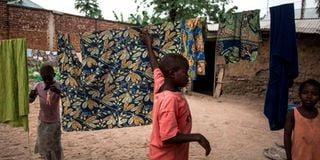Bubonic plague kills 44 children in DRC’s Ituri province

Children at an orphanage in DRC. At least 44 children have died in Ituri province of the Democratic Republic of Congo, UNICEF said on September 3, 2021.
Kinshasa
At least 44 children have died in Ituri province of the Democratic Republic of Congo (DRC) following an outbreak of bubonic plague, a UNICEF report has revealed.
The information delivered on September 3, 2021, by the United Nations mission in the DRC in its news report was confirmed by DRC’s Ministry of Health.
In this report, UNICEF says it is "increasingly concerned about the impact on children of the resurgence of the bubonic plague in the province of Ituri in Democratic Republic of the Congo".
"New research made by UNICEF shows that children are particularly at risk of contracting the plague, which in recent months has made a comeback for the first time in a decade. Figures show that 578 cases and 44 deaths have been recorded in Ituri province," said the United Nations mission in the DRC.
Symptoms of this disease include swollen lymph nodes in the groin, armpits, or neck, fever, chills, headache, fatigue and muscle pain.
Twice the size of Belgium, the province of Ituri, with an area of 65,000 square kilometres, has around 4,500,000 inhabitants.
Ituri is one of the few places in the world — along with Madagascar and Peru — where cases of the plague continue to be reported.
"The ongoing outbreak differs from previous ones. Cases of the highly infectious bubonic and pneumonic plague, which is transmitted from person to person by air, have been recorded in areas free from previous outbreaks. This disease has been reported closely the border with South Sudan and Uganda. Frequent displacement of populations and insecurity in the region create a considerable risk of cross-border transmission," UNICEF says.
The UN agency adds that plague outbreaks are often attributed to poor sanitation and hygiene practices which attract rats carrying fleas which in turn infect people and their homes.
"The plague can strike the poorest families in particular. Those who are also vulnerable to diseases such as malaria are particularly at risk," says UNICEF.





